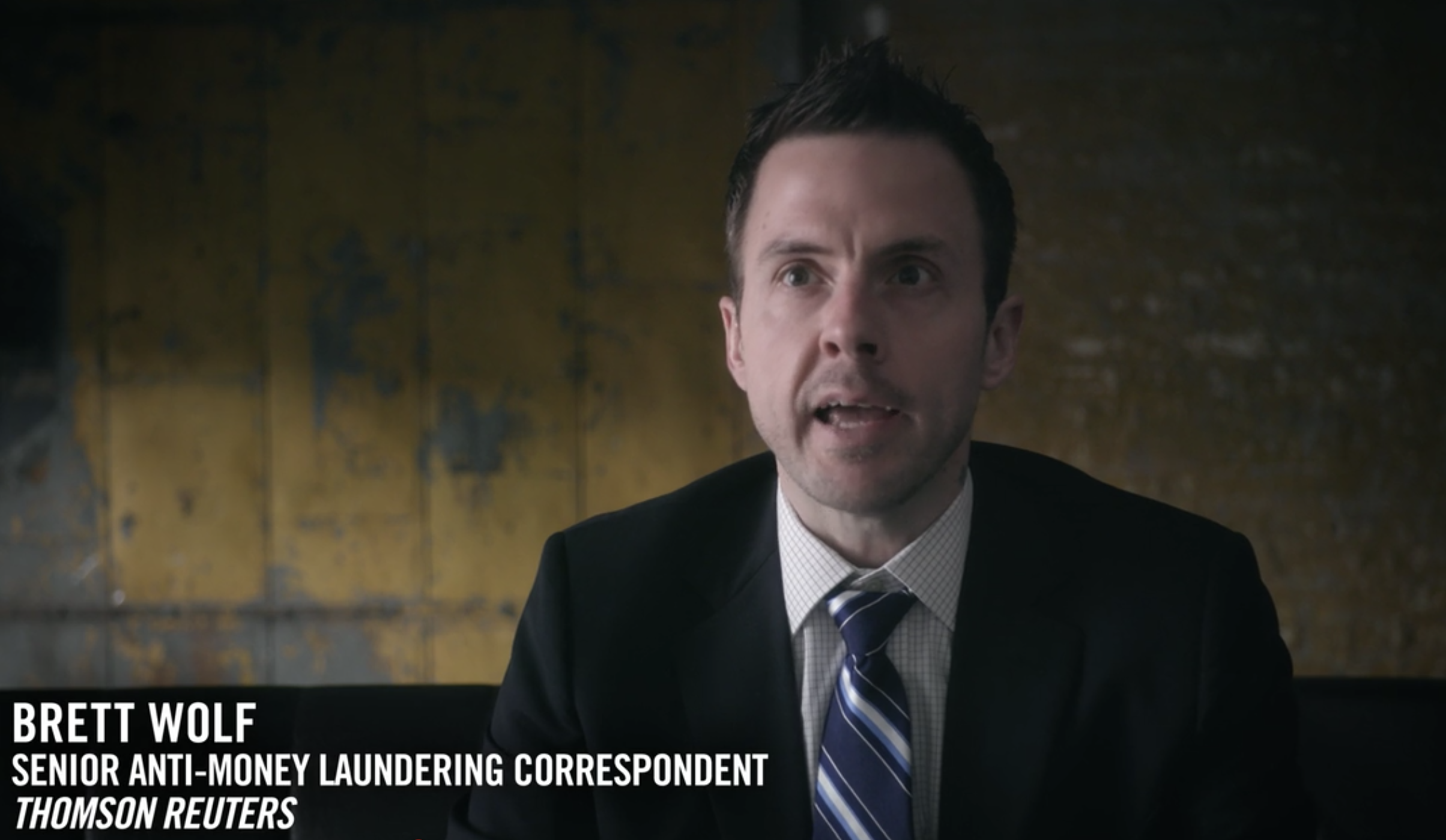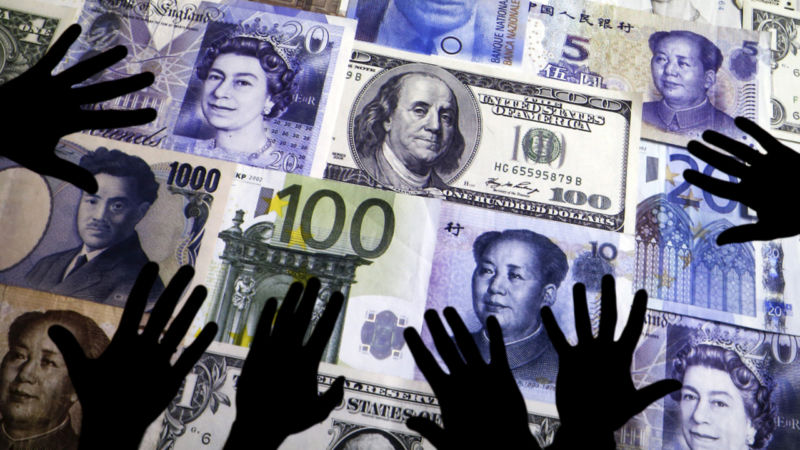Brett Wolf shares how his investigative reporting on money laundering, Mexican drug cartels and a leading global bank led to working on an acclaimed documentary.
Thomson Reuters Regulatory Intelligence Senior Anti-Money Laundering Correspondent Brett Wolf was contacted by the producers of Dirty Money: Cartel Bank because they wanted to tell the story of HSBC’s anti-money laundering lapses and the hundreds of millions of dollars the bank ultimately admitted laundering for drug cartels as well as the response from regulators, law enforcement authorities and even Congress.
We sat down with Brett to get a behind-the-scenes look at his contribution to the documentary.
Q: How did you become involved in the project? Why were they interested in your work?
A: The reason the producers chose me was that I, a specialist reporter with the Thomson Reuters Regulatory Intelligence editorial team who for more than a decade has focused on anti-money laundering compliance issues, in 2012 began working with various Reuters News reporters to reveal the scope of HSBC’s compliance failures.
If you visit Reuters.com and search for “Brett Wolf HSBC” you will see dozens of articles that reveal – from beginning to end – the story of how the global bank became embroiled in cartel laundering activity in Mexico. The tale really began when our team reviewed some confidential papers that explained law enforcement concerns and our long-running series of articles took off from there. That article, the genesis of our Thomson Reuters news collaboration, is available here.
The producers of “Dirty Money: Cartel Bank” used our Thomson Reuters team’s reporting as a roadmap for their documentary. In many cases, they went back and spoke to the sources who we interviewed in 2012 and 2013. Therefore, the producers asked me to walk them through how the story developed to add color and fill in knowledge gaps and to ensure the factual accuracy of their program.

Q: How big a problem is money-laundering?
A: Many large U.S. banks, as well as foreign banks, have been fined to varying degrees over anti-money laundering failures. Billions of dollars in fines have been doled-out. A good summary of recent actions is available here.
However, what made the HSBC story so compelling was the dramatic nature of its offenses. Most money laundering experts can recount the 1980s in Miami when drug traffickers would walk into banks with duffel bags full of dirty cash and complicit bankers would accept the deposits, no questions asked. In essence, a very similar scenario played out in the 2000s as branches of the Mexico unit of HSBC took in massive sums of U.S. dollars (money that ultimately was shipped back to the United States for deposit with the Fed) without taking steps to ensure the cash was the product of legitimate commerce.
Of course, as we now know, much of the money was in fact U.S. currency generated by cartel drug sales in the United States. The cartels smuggled the dirty money from the streets of the United States and into Mexico for deposit at HSBC branches because U.S. banks would not have touched the stacks of cash without asking questions and reporting the activity to authorities.
The story was an important one – and unique – because it involved both murderous drug cartels but also laid bare what can happen when banks fail to engage in proper risk management. HSBC, as an entity, had labeled its Mexico unit as low-risk solely because it was a subsidiary. That decision failed to take into account the situation on the ground in Mexico and the grave money laundering risk that exists there due to the cartels. As a result, the cartel money laundering was not properly scrutinized, detected or reported, even after warnings from law enforcement.
The U.S. Senate Permanent Subcommittee on Investigations was appalled at HSBC’s legacy practices in Mexico and produced a report and held a hearing where it excoriated not only the bank, but the OCC for failing to detect and address the bank’s AML shortcomings sooner. While many banks have faced criticism for AML lapses, HSBC stands out as perhaps the most high-profile case.
Before ultimately entering into a so-called deferred prosecution agreement with HSBC in 2012, wherein the bank agreed to forfeit nearly $2 billion and vowed to improve its AML compliance program, the U.S. Justice Department and the Manhattan District Attorney’s Office long debated whether to indict the bank on criminal charges. It was an extremely serious matter.
Q: The HSBC/Mexico story is about drugs. What other kinds of illicit activities are problem areas for money laundering?
A: There are many problem areas. Official corruption, illegal arms sales, human trafficking and prostitution, embezzlement, insider trading, fraud schemes to name just a few. New technologies, such as bitcoin and other cryptocurrencies, are heightening the AML challenges for both the public and private sectors. Meanwhile, banks are working to comply with new rules requiring them to do a better job of knowing their customers.
Q: In the documentary, it is clear that the risk/vulnerability of a bank to money laundering comes from a combination of complicity/failures within the bank and outside actors. How do organizations protect themselves against both of these?
A: The key is knowing your customers and understanding their banking activity. This “KYC” responsibility requires up-to-date information about your customers – looking through corporate entities to the true accountholders – as well as effective monitoring for activity that does not appear legitimate. In the end, banks are not law enforcement professionals and cannot know if suspect activity is truly criminal, but they must notify authorities when they spot something unusual and deem it suspicious.
Q: How does Thomson Reuters help our customers with these issues? How do documentaries like Dirty Money help to address the issue?
A: Thomson Reuters and other companies offer a variety of solutions to aid the above-mentioned AML compliance obligations of financial institutions. Our Regulatory Intelligence product keeps compliance professionals up-to-date on rules and enforcement. Our reports are intended to help financial institutions by highlighting both best- and worst- practices in AML compliance. The hope is that lessons will be learned and the global financial system will be at least a bit “cleaner” thanks to efforts to push forward in the fight against financial crime.
Q: Are there important lessons to be learned from this (or other recent examples)?
A: The basic lesson to be learned is that AML and regulatory risk must be properly addressed via global, enterprise-wide policies and procedures and that banks must know who their true customers are. An effective AML program is not easy, or cheap, to develop. Banks are spending billions of dollars in an effort to get it right. Our hope is that our Regulatory Intelligence product will help institutions direct their resources as effectively as possible and stay in the good graces of regulators and other authorities.
Learn more
Thomson Reuters Regulatory Intelligence includes global coverage of over 900 regulatory bodies and more than 2,500 collections of regulatory and legislative materials. It is powered by exclusive news, analysis, and practical guidance from our global team of regulatory compliance experts and journalists.
Learn more about the global fight against financial crime.






